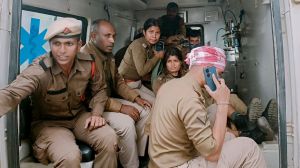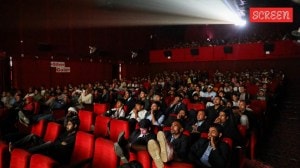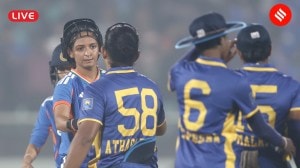Stay updated with the latest - Click here to follow us on Instagram
Portrait of a Playwright
Habib Tanvirs never-published memoir hits the bookstores in an English translation by Mahmood Farooqui.
My life,anyway,is an open book, thus began Habib Tanvir known for ushering in radical sensibilities in Indian theatre while writing his memoir,in Urdu,when he was in his early 80s. It was never published. As Delhi-based Mahmood Farooqui,a writer,director and friend who worked closely with Tanvir,prepares to launch his translation of the book in English on May 28,he plunges us into a riveting journey about the life and thoughts of the late theatre icon.
Simply titled Memoir (Penguin Books India,Viking,Rs 599),the book begins with Tanvirs childhood and continues with his foray into the Mumbai film industry in the 40s and being a witness to the political,cultural and artistic tectonic shifts in Indias cultural scene. Given below are excerpts from an interview with Farooqui:
Why a translation of Habib Tanvirs memoir and when did you start?
He had asked me if I wanted to do it and I had said yes. He had also shared a few chapters and it was very exciting material. I started six years ago,on-and-off,but I worked on it consistently over the last two years.
As the memoir clearly reveals,Tanvir was not shy of expressing his vice. He was known for his fondness for alcohol as well as being a ladies man.
In his biography,he has written about his vice very candidly. I dont think he had any vice that harmed anyone else or the society. One day,after his wife had passed away,he was sitting with me and my wife (Anusha Rizvi) and jokingly said how he would ideally like to have a 65-year-old woman around him.
Tanvir also wanted to play the role of the old woman in your film Peepli Live,but it didnt work out.
He wanted to and we seriously considered it. It would have been quite a coup. But,he fell ill at that time. The idea in itself was very radical and came about because he had directed a play called Jis Lahore Nahin Dekhya Vo Janmya Hi Nahi,in which,traditionally,a man plays an old Hindu woman in Lahore.
Tanvirs memoir is as much a story of Indian history as of his own life.
Its an extremely valuable document as it allows us a peek into India in the 20s to the 40s,which are vital decades for the country. There was a lot of ferment intellectually,culturally and politically,and his memoir gives us an account of his life as well as the times he lived in. For instance,when you read about the Quit India Movement in his memoir,you see a bunch of students walking down the street when they see a child waving a flag. They go ahead,have tea and come back,only to see the child dead. This kind of first-hand experience provides a rare window into our past.
Were there any hitches while translating his memoir?
There was a lot of poetry in the memoir and it was very difficult to translate them. But,by and large,he used very lucid prose which wasnt that difficult. My main job was to keep myself out of it so that it appears that it has come directly from the writer. Also,half the time he wasnt around. So I had to do a little bit of guess work.
Do you wish there was more to the memoir?
Definitely. His memoir comes to a stop in 1954 and he wanted to write three volumes. I wished he had written more about theatre from the 60s to 80s. A full-fledged account of his own artistic journey and work is missing.
Memoirs will be launched at IHC on May 28,accompanied by a performance by Habib Tanvirs daughter,Nageen,and troupe. Contact: 46131413







